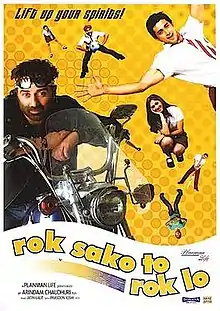Rok Sako To Rok Lo
Rok Sako To Rok Lo (lit. 'Stop Me if You Can') is a 2004 Indian sports drama film produced and directed by Arindam Chaudhuri, in his debut. The film stars Yash Pandit, Manjari Fadnis, Sunny Deol, Carran Kapur, Aparna Kumar and Ram Menon in the lead roles. The music was scored by Jatin Lalit.[1]
| Rok Sako To Rok Lo | |
|---|---|
 Film poster | |
| Directed by | Arindam Chaudhuri |
| Produced by | Arindam Chaudhuri |
| Written by | Arindam Chaudhuri |
| Starring |
|
| Music by | Jatin-Lalit |
| Cinematography | Santosh Thundiyil |
| Edited by | Raviranjan Maitra, Kajal Naskar (Co Director) |
Release date |
|
| Country | India |
| Language | Hindi |
Plot
There are two neighbouring high schools – Bharti School, for the middle-class and Valley High School, for the affluent. Dev (Yash Pandit), Suhana (Manjari Fadnis), and their friends come from Bharti, and are often disturbed by their enemies who come from Valley High. The Valley High students also defeat the Bharti students in every single inter-school event that happens every year, which is the main reason why they make fun of Bharti. One day however, the Bharti students are saved from the Valley High students by a mysterious man Kabir Mukherjee (Sunny Deol), who they initially feared because of his rough looks, thereby the reason they always called him "Phantom". The Bharti students get close to Kabir and befriend him, and with time he also becomes more gentle and normal, thereby getting rid of his "Phantom" look.
Dev, however gets attached to Sanjana (Aparna Kumar), a girl from Valley High, which results in him dropping Suhana. But Sanjana eventually rejects him because he once insulted her at a café and because he belongs to the rival school. One day while driving in an open road, Dev and his friends are again insulted and considered "slow" by the Valley High students who are also driving on the same road. Dev drives faster and overtakes them, but the car quickly meets with an accident and crashes. Everyone in the car survives, except Kabir,who died while saving the young guys. This leaves the Bharti students dismayed and defenceless against the Valley High students, with whom they have an upcoming 100 metres race competition. Dev however is still determined, so he trains up and attends the race with full confidence. During the race, he gets injured by one of the runners, but does not lose hope and through last-minute strength, he eventually wins the race, thereby finally letting Bharti get their revenge on Valley High. Incidentally the prize for the winner is a bike similar to Kabir's, so Dev becomes the new "Phantom".
Cast
- Sunny Deol – Kabir "Phantom" Mukherjee
- Yash Pandit – Dev
- Manjari Fadnis – Suhana
- Namrata Shirodkar – Sandra / Narrator
- Carran Kapur – Ranveer Pratap Singh
- Aparna Kumar – Sanjana
- Deepti Bhatnagar – Dev's Bhabhi
- Archana Puran Singh – Sweety
- Tinnu Anand – S.V.P.S, Balasubramaniam Iyer
- Rakesh Bedi – Ghodbole
- Rajit Kapoor – Sweety's husband
- Tiku Talsania – Sweety's husband
- Aanjjan Srivastav – Ganguly
- Ram Menon
- Karun Punchi
- Abbas Saria
- Ajay Sheoparna
- Jehan Hillowalla
- Shreya Das
Production
Rok Sako To Rok Lo was the directorial debut for Arindam Chaudhuri.[2] According to him, "The central theme is friendship". He also mentioned that it would show how "the principal of management can help reduce wastage of money in the film industry." The film was one out of 50 different stories which he worked on. The cast had mostly teenage debutants, while established actors like Tikku Talsania, Archana Puransingh, Anjan Srivastva, Rakesh Bedi, Tinu Anand and Rajit Kapoor played supporting roles. To choose a title for the film, Chaudhuri conducted "market research".[3]
Soundtrack
The film's musical score was composed by Jatin Lalit, while the lyrics were written by Prasoon Joshi.[4]
| No. | Title | Singer(s) | Length |
|---|---|---|---|
| 1. | "Haan Mujhe Thaam Le" | Babul Supriyo, Alka Yagnik | 04:25 |
| 2. | "Jaane Kise" | Shaan, Alka Yagnik | 04:26 |
| 3. | "Nazron Ka Yaarana" | Shaan, Sunidhi Chauhan | 05:10 |
| 4. | "Rok Sako To Rok Lo" | Shaan, Babul Supriyo, Shreya Ghoshal, Lalit Pandit, Ishaan | 04:31 |
| 5. | "Tera Gham" | Sonu Nigam, Alka Yagnik | 04:03 |
| 6. | "Yaaron Sun Lo" | Abhijeet Bhattacharya | 05:08 |
| 7. | "Yaaron Sun Lo" (Sad) | Abhijeet Bhattacharya | 01:55 |
Reception
Rediff.com said, "Manjari has performed well, but Yash looks nervous in some scenes", and further wrote "I would recommend renting a Jo Jeeta Wohi Sikander DVD instead of spending money to watch this film."[2] Subhash K. Jha rated the film 2/5 and said, "Sadly, the film's basic tenor is too flighty to hold up such lofty ideas. Thoughts that go beyond eye candy entertainment float in and out of the narrative without getting a chance to lodge themselves in the plot."[5]
References
- "Rok Sako To Rok Lo Cast and Crew". Archived from the original on 2 February 2011. Retrieved 14 January 2012.
- "Dekh sako to dekh lo!". Rediff.com. 10 December 2004. Retrieved 4 May 2019.
- Siddiqui, Rana (8 March 2004). "Rok sako to rok lo". The Hindu. Retrieved 4 May 2019.
- http://www.raaga.com/channels/hindi/moviedetail.asp?mid=h000752
- http://www.nowrunning.com/movie/1846/bollywood.hindi/rok-sako-to-rok-lo/361/review.htm